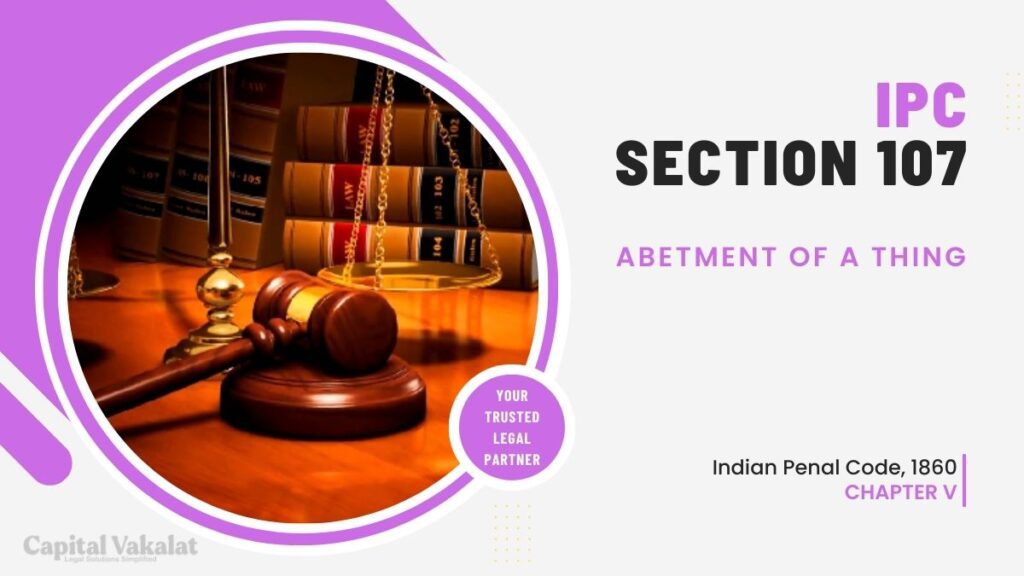In the labyrinth of legal terminologies, Section 107 IPC stands as a significant pillar that often remains obscured from the public eye. Yet, it plays a crucial role in the Indian Penal Code, shaping the legal landscape with respect to abetment.

In this article, we delve into the intricacies of Section 107 IPC, demystifying its provisions and exploring its implications.
Understanding the Basics
What is Section 107 IPC?
Section 107 of the Indian Penal Code (IPC) defines the act of abetment concerning a ‘thing.’ Abetment, in a legal context, refers to the act of instigating, encouraging, or aiding someone to commit a crime. However, this section specifically deals with abetment of a ‘thing’ rather than a person.
What Constitutes a ‘Thing’?
In legal terms, a ‘thing’ can encompass a wide array of objects or items. It could refer to anything from property, documents, or even animals. The abetment of a ‘thing’ typically involves assisting or facilitating an unlawful act involving these objects.
Key Provisions
Abetment Defined
Section 107 lays down that abetment involves three essential elements:
- Instigating someone to do a thing.
- Engaging with them in a conspiracy to do that thing.
- Aiding or facilitating the commission of that thing.
Punishments
Depending on the gravity of the abetted crime, the punishment may vary. Section 107 IPC doesn’t specify the punishment itself but rather provides a framework for prosecuting individuals involved in abetment.
Real-World Applications
Abetment of Theft
One common application of Section 107 IPC is in cases of theft. Suppose someone encourages or aids another person in stealing a valuable item. In that case, both the instigator and the thief can be charged under this section.
Abetment of Forgery
Similarly, if an individual assists another in forging documents or signatures, Section 107 IPC can be invoked against both parties involved.
Legal Interpretations
Mens Rea
For a successful conviction under Section 107 IPC, the prosecution must establish that the abettor had a guilty mind (mens rea). In other words, they must prove that the abettor intended to aid in the commission of the crime.
Active Participation
The abettor doesn’t necessarily have to be physically present at the crime scene. Even remote assistance or encouragement can fall under the purview of Section 107 IPC.
Conclusion
In the vast realm of Indian criminal law, Section 107 IPC serves as a crucial tool in addressing acts of abetment concerning ‘things.’ It underscores the importance of holding individuals accountable for their role in facilitating or encouraging illegal activities. Understanding this section is vital not only for legal professionals but also for citizens who wish to comprehend the intricacies of the Indian Penal Code.
FAQs
Can someone be charged under Section 107 IPC for unintentional assistance?
Section 107 IPC requires a guilty mind (mens rea) on the part of the abettor. Unintentional assistance may not lead to charges under this section.
What are some common examples of abetment involving ‘things’?
Common examples include abetment of theft, forgery, destruction of property, and tampering with documents.
Can abetment under Section 107 IPC apply to corporate entities?
Yes, Section 107 IPC can be applied to corporate entities if they are found to be involved in abetting unlawful activities related to ‘things.’
How can one defend against charges of abetment under Section 107 IPC?
A strong defense may involve proving lack of mens rea or establishing that the accused had no knowledge of the abetted crime.